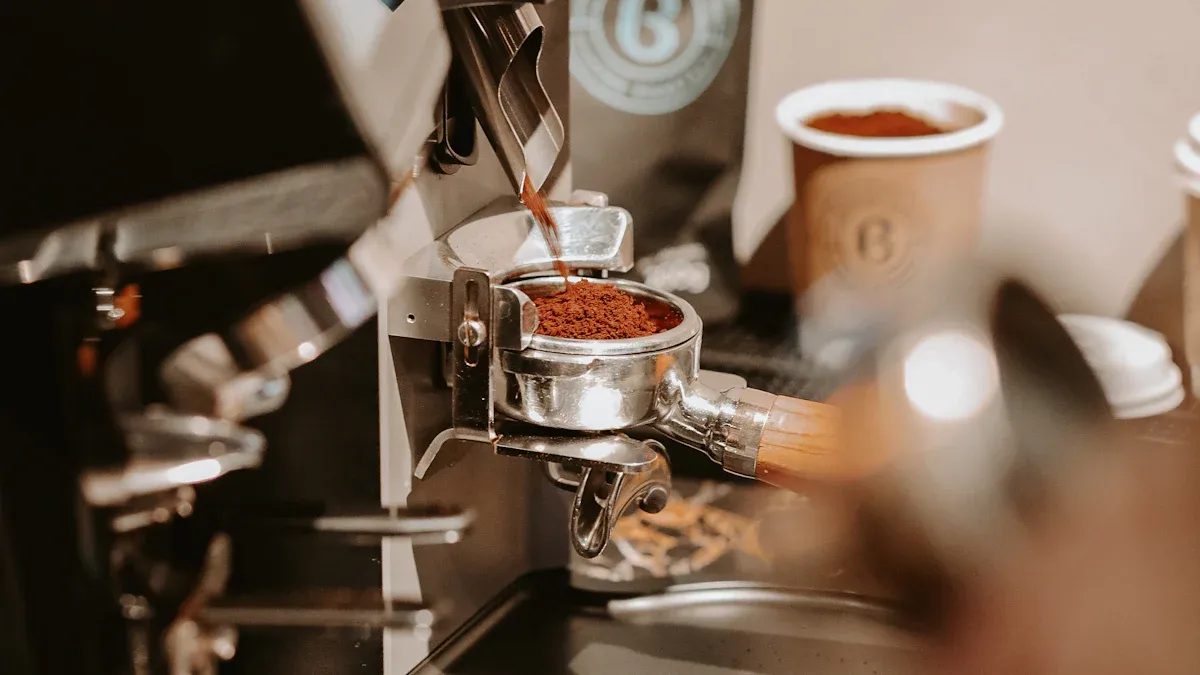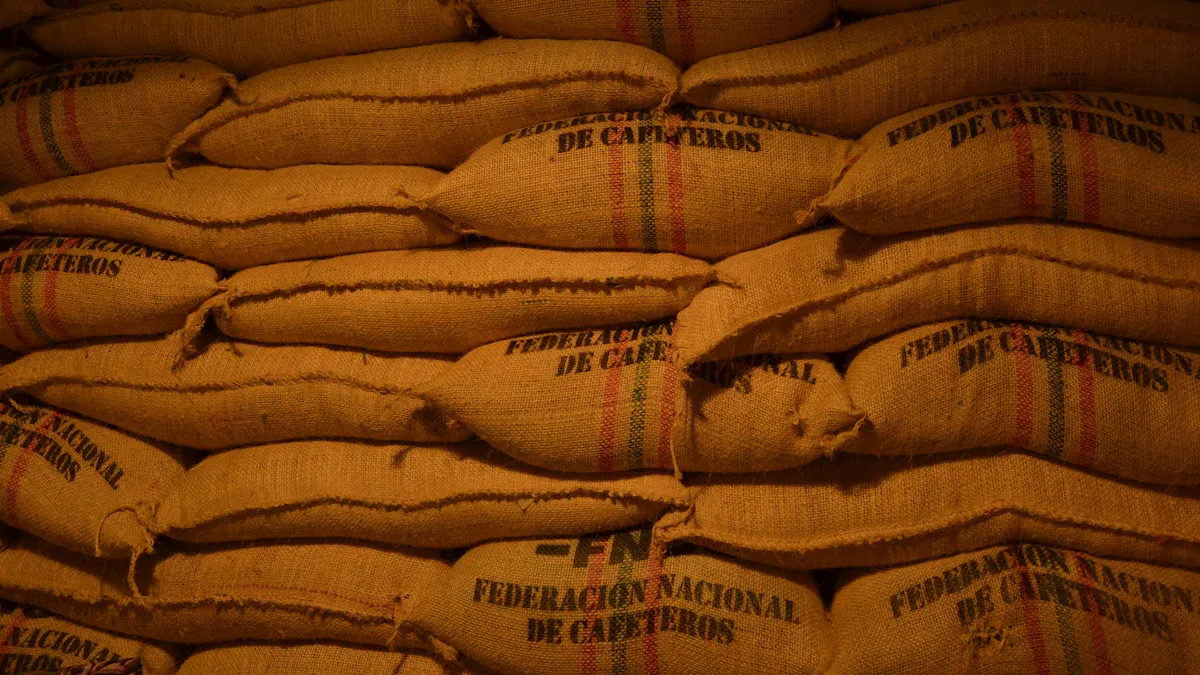
The 2025 Global Coffee Machine Market presents a transformative opportunity for B2B suppliers. This market is projected to generate total revenue of $473.10 billion by 2025, with at-home coffee consumption contributing $96.45 billion and out-of-home consumption reaching $376.70 billion. These figures underline the immense potential for suppliers to expand their reach and profitability. Leveraging precise market insights enables businesses to refine their strategies, ensuring alignment with consumer demands and industry shifts. Adapting to evolving trends and challenges is no longer optional; it is essential for maintaining a competitive edge in this dynamic marketplace.
Key Takeaways
- The world coffee machine market may hit $473.10 billion by 2025. Both home and outside coffee use are growing fast.
- Companies should use new technology, like smart coffee machines. These meet customer needs for ease and custom options.
- Being eco-friendly is very important. Companies should use green methods to improve their image and attract eco-aware buyers.
- New markets, especially in Asia Pacific, have big chances to grow. Companies should make products that match local tastes.
- Keeping customers happy with special services and rewards builds loyalty. This helps keep steady income and loyal buyers.
Overview of the 2025 Global Coffee Machine Market

Market Size and Growth Projections
The 2025 Global Coffee Machine Market is poised for significant growth, with an estimated annual production of 350 million units generating approximately $25 billion in revenue. The market is expected to grow at a compound annual growth rate (CAGR) of 5% over the next five years. Capsule coffee machines dominate the market, holding a 40% share due to their convenience and efficiency. Rising disposable incomes, the growing popularity of specialty coffee, and advancements in technology are key drivers of this growth. However, challenges such as environmental concerns related to single-serve capsules and price sensitivity persist.
| Year | Market Size (USD Billion) | CAGR (%) |
|---|---|---|
| 2025 | 18.72 | 6 |
| 2030 | 25.05 | - |
The future outlook remains optimistic, with ongoing innovations in sustainability expected to address environmental challenges and further boost market expansion.
Regional Market Dynamics
Regional dynamics play a crucial role in shaping the 2025 Global Coffee Machine Market. Europe leads with a 35% market share, driven by high consumption in countries like Italy, Germany, and France. North America ranks as the second-largest market, where consumers prioritize convenience and specialty coffee. The Asia Pacific region is the fastest-growing market, fueled by a rising middle class and increasing demand for premium espresso machines.
| Region | Market Share | Key Characteristics |
|---|---|---|
| Europe | 35% | Major consumers include Italy, Germany, and France. Instant coffee remains popular. |
| North America | 2nd largest | Preference for single-serve machines and specialty coffee. |
| Asia Pacific | Fastest-growing | Adoption of Western coffee culture and premium espresso machines. |
| Latin America | N/A | Influenced by domestic use in Brazil and Colombia. |
| Middle East & Africa | N/A | Emerging market potential with unique coffee traditions like Turkish coffee. |
Key Market Segments: Commercial vs. Residential
The coffee machine market is divided into two primary segments: commercial and residential. The residential segment focuses on convenience and quality, catering to consumers seeking a café-like experience at home. Machines in this segment emphasize ease of use and high-quality coffee.
- Residential Market Segment: Designed for convenience and minimal effort, these machines provide high-quality coffee for home use.
- Commercial Market Segment: Prioritizes efficiency and cost-effectiveness. Businesses invest in machines that enhance productivity and reduce wait times during peak hours.
The commercial segment, which includes restaurants, offices, and hotels, demands machines capable of handling high volumes while maintaining premium beverage quality. Both segments present unique opportunities for suppliers to innovate and meet diverse consumer needs.
Key Trends Driving the Coffee Machine Market

Technological Innovations in Coffee Machines
Technological advancements are reshaping the coffee machine industry, driving growth and enhancing user experiences. The adoption of smart coffee machines equipped with connectivity features has gained traction, particularly among younger demographics. These machines allow users to control brewing remotely, offering convenience and personalization.
- The market penetration rate of single-serve coffee systems in North American households exceeds 30%, highlighting the demand for quick and efficient coffee preparation.
- Modular construction and 3D printing are revolutionizing manufacturing processes, enabling companies to improve operational efficiency and meet evolving consumer expectations.
| Trend | Description |
|---|---|
| Smart Coffee Machines | Increasing popularity of machines that allow remote brewing control. |
| Health and Wellness Focus | Rising consumer interest in healthier coffee options and better brewing methods. |
| Sustainable Practices | Growing demand for eco-friendly coffee machines and sustainable practices. |
These innovations not only cater to convenience but also align with broader consumer trends, such as health-conscious choices and eco-friendly practices.
Tip: Suppliers should prioritize integrating smart features and modular designs into their product offerings to stay competitive in the 2025 Global Coffee Machine Market.
Sustainability and Energy Efficiency as Market Drivers
Sustainability has emerged as a critical factor influencing consumer purchasing decisions. Manufacturers are increasingly focusing on reducing water usage, energy consumption, and waste in coffee machines. The U.S. Environmental Protection Agency’s ENERGY STAR program reported that certified commercial coffee brewers use, on average, 35% less energy than standard models.
- Energy-efficient machines, recyclable pods, and ethically sourced coffee beans are gaining popularity among environmentally conscious consumers.
- Rental companies offering eco-friendly options contribute approximately $500 million annually to the market.
These practices not only address environmental concerns but also enhance brand reputation and customer loyalty. Suppliers who adopt sustainable manufacturing methods and offer energy-efficient products can tap into this growing demand effectively.
Note: Sustainability is no longer optional; it is a key driver for growth in the coffee machine market.
Changing Consumer Preferences and Their Impact
Consumer preferences are evolving rapidly, influencing the coffee machine market in profound ways. Subscription-based models for coffee machines are gaining traction, with 30% of buyers opting for rental or lease options. This trend reflects a shift towards affordability and flexibility.
| Trend Description | Percentage/Yearly Growth | Source |
|---|---|---|
| Subscription-based coffee machine buyers opting for rental or lease models | 30% | International Coffee Organization (March 2023) |
| Global demand for coffee machine maintenance and aftermarket products | 15% | MarketWatch (September 2022) |
Additionally, the demand for aftermarket products and maintenance services is growing at an annual rate of 15%. Consumers are increasingly seeking machines that offer customization, durability, and ease of maintenance. Price sensitivity remains a significant factor, with suppliers balancing premium and budget-friendly options to cater to diverse needs.
Insight: Suppliers should focus on offering flexible purchasing models and robust maintenance services to align with changing consumer behaviors.
Challenges and Opportunities for B2B Suppliers
Managing Supply Chain Complexities
The 2025 Global Coffee Machine Market presents unique challenges for B2B suppliers, particularly in managing supply chain complexities. Tariffs and trade wars have significantly impacted procurement strategies, leading to rising costs and delayed materials. Suppliers relying on global sourcing face heightened vulnerability due to sudden policy shifts and geopolitical tensions. For instance, the long-term effects of tariff policies, such as those introduced during the Trump administration, continue to reshape supply chain dynamics.
To navigate these challenges, suppliers must adopt agile procurement strategies. Diversifying sourcing locations and building strong relationships with regional partners can mitigate risks. Additionally, leveraging technology to enhance supply chain visibility and efficiency is becoming increasingly critical. By addressing these complexities proactively, suppliers can maintain operational stability and meet market demands effectively.
Competing in a Saturated Market
The coffee machine market is becoming increasingly saturated, with intense competition across both commercial and residential segments. Suppliers must differentiate themselves to thrive in this environment. The global coffee machine market, valued at $6.41 billion in 2022, is projected to reach $9.26 billion by 2030, growing at a CAGR of 4.7%. Similarly, the espresso machine segment is expected to grow at a CAGR of 6.0%, highlighting the competitive landscape.
| Market Segment | Market Size (2022) | Projected Size (2030) | CAGR (%) |
|---|---|---|---|
| Global Coffee Machine Market | USD 6.41 billion | USD 9.26 billion | 4.7% |
| Global Espresso Machines Market | N/A | USD 6.58 billion | 6.0% |
To stand out, suppliers should focus on innovation and value-added services. Offering customizable solutions, such as tailored branding or unique coffee blends, can attract business clients. Additionally, investing in marketing strategies that emphasize product quality and sustainability can help suppliers capture a larger market share. By addressing customer needs and staying ahead of industry trends, suppliers can overcome the challenges of market saturation.
Tapping into Emerging Markets and Niches
Emerging markets offer significant growth opportunities for B2B suppliers in the coffee machine sector. These markets are expected to grow at a CAGR of around 6% over the next five years, driven by rising disposable incomes and the adoption of Western coffee culture. The global coffee machine rental market also presents a lucrative opportunity, with its value projected to increase from $2 billion in 2023 to $3.5 billion by 2028.
- Increasing disposable incomes in emerging economies are driving demand for premium coffee machines.
- Geographical expansion into these regions allows suppliers to tap into new customer bases.
- The rental market offers flexibility for businesses, making it an attractive option for cafes, restaurants, and offices.
Suppliers can capitalize on these opportunities by tailoring their offerings to local preferences and investing in market research. For example, introducing compact, energy-efficient machines can appeal to cost-conscious consumers in these regions. By focusing on emerging markets and niches, suppliers can diversify their revenue streams and achieve sustainable growth.
Strategies for Success in the 2025 Coffee Machine Market
Differentiating Through Innovation
Innovation remains a cornerstone for success in the competitive coffee machine market. Companies that prioritize technological advancements and sustainability are better positioned to capture consumer interest. The market, projected to reach $13,740 million by 2025, thrives on convenience and premium features. Capsule coffee machines, for instance, have gained traction due to their ease of use and consistent brewing quality.
To stand out, suppliers should focus on integrating smart technologies, such as app-controlled brewing systems, into their products. These features cater to tech-savvy consumers seeking convenience and personalization. Additionally, energy-efficient designs and eco-friendly materials align with the growing demand for sustainable solutions. By addressing these trends, businesses can enhance their market competitiveness and foster long-term growth.
Tip: Suppliers should invest in R&D to develop innovative products that improve user experience and reduce environmental impact.
Building Long-Term Client Relationships
Establishing strong client relationships is essential for sustained success in the 2025 Global Coffee Machine Market. Companies like Nestlé and JAB Holding have demonstrated the value of extensive distribution networks and diverse product portfolios. Smaller firms can emulate this approach by leveraging local expertise and offering personalized services.
Loyalty programs, such as tiered rewards or points-based systems, can encourage repeat purchases and strengthen customer retention. These programs also provide valuable insights into consumer preferences, enabling businesses to tailor their offerings effectively. Regular communication, proactive support, and transparent practices further enhance trust and loyalty among clients.
Insight: Building long-term partnerships with clients not only ensures steady revenue but also fosters brand advocacy in a competitive market.
Offering Customization and Value-Added Services
Customization has become a defining trend in the coffee machine industry. Businesses that cater to specific consumer needs, such as dietary preferences or unique brewing requirements, gain a competitive edge. Personalized marketing strategies, including SMS campaigns, can boost sales and enhance customer loyalty.
Value-added services, such as maintenance packages and training programs, further differentiate suppliers from competitors. These services address common pain points, such as machine upkeep, while providing additional revenue streams. Suppliers should also explore opportunities in the rental market, which is projected to grow significantly in the coming years. Offering flexible rental options can attract cost-conscious businesses and expand market reach.
Note: Customization and value-added services not only meet diverse consumer demands but also create opportunities for upselling and cross-selling.
The 2025 Global Coffee Machine Market Report highlights critical drivers, restraints, and opportunities shaping the industry. Increasing demand for freshly brewed coffee, rising disposable incomes, and technological advancements fuel market growth. However, challenges like high initial costs and maintenance requirements persist.
| Category | Insights |
|---|---|
| Market Drivers | Rising disposable incomes, café culture expansion, and specialty coffee popularity. |
| Market Restraints | High costs and competition from low-cost alternatives. |
| Market Opportunities | Untapped markets and innovative product development. |
Staying informed about these trends enables suppliers to adapt and thrive. By leveraging insights, businesses can innovate, differentiate, and achieve sustainable growth in this dynamic market.
Tip: Proactive strategies and a focus on innovation will help suppliers maintain a competitive edge.
FAQ
What are the key factors driving growth in the coffee machine market?
Rising disposable incomes, the growing popularity of specialty coffee, and advancements in technology are driving market growth. Consumers increasingly seek convenience and premium coffee experiences, which fuels demand for innovative coffee machines. Sustainability and energy efficiency also play a significant role in shaping purchasing decisions.
How can B2B suppliers differentiate themselves in a saturated market?
Suppliers can stand out by offering innovative features, such as smart technologies and energy-efficient designs. Customization options, value-added services like maintenance packages, and flexible purchasing models also help attract and retain clients. Emphasizing sustainability and premium quality further enhances competitiveness.
Which regions offer the most growth potential for coffee machine suppliers?
The Asia Pacific region presents the fastest growth opportunities due to rising disposable incomes and the adoption of Western coffee culture. Emerging markets in the Middle East, Africa, and Latin America also show potential, driven by increasing demand for premium coffee machines and rental options.
What role does sustainability play in the coffee machine market?
Sustainability is a critical factor influencing consumer choices. Energy-efficient machines, recyclable pods, and eco-friendly manufacturing practices are in high demand. Suppliers adopting sustainable practices not only address environmental concerns but also enhance brand reputation and customer loyalty.
What trends should suppliers watch in 2025?
Suppliers should monitor trends like smart coffee machines, subscription-based purchasing models, and the growing demand for aftermarket services. Innovations in modular construction and 3D printing are also reshaping manufacturing processes, offering opportunities to improve efficiency and meet evolving consumer expectations.
Post time: Apr-15-2025
